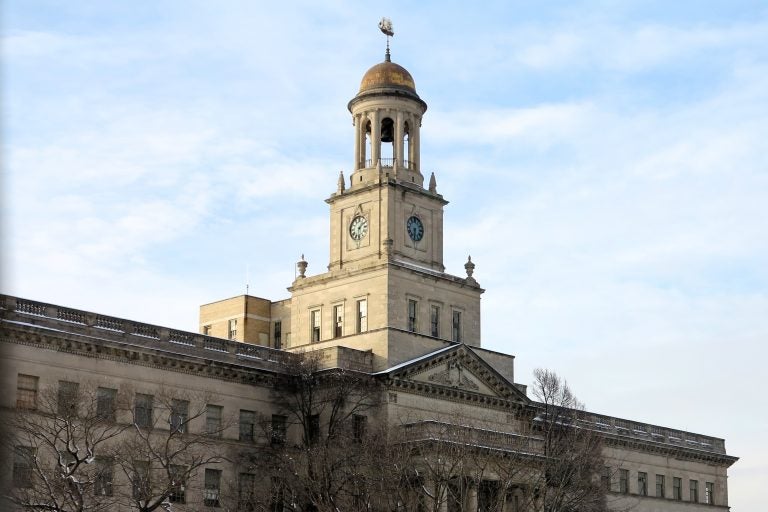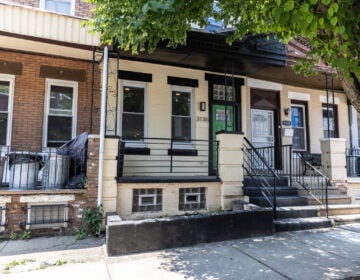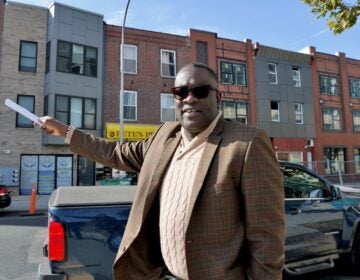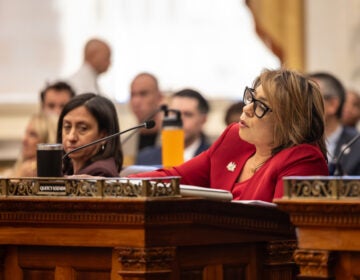Provident Mutual building redevelopment to move forward with Blackwell’s support
A developer’s plan to transform the former Provident Mutual Life Insurance Co. building into a sprawling health campus will move forward with Jannie Blackwell's support.

Provident Mutual Life Insurance Building, 2014 (Ashley Hahn/PlanPhilly)
This story originally appeared on PlanPhilly.
—
A developer’s plan to transform the former Provident Mutual Life Insurance Co. building into a sprawling health campus will move forward with the support of West Philadelphia City Councilwoman Jannie Blackwell, the incumbent legislator said Monday.
The support reflects a reversal in her position motivated, she said, by a flood of letters from unions, anchor institutions, and neighborhood groups, some touting community benefits agreements with the developer.
Iron Stone Real Estate Partners plans to purchase the 13-acre property from the city for $10 million. Iron Stone’s plans include space for tenants including the University of Pennsylvania, Children’s Hospital of Philadelphia, Public Health Care Management Corporation and the YMCA.
The city sunk $52 million acquiring the historic building and renovating it before putting it up for competitive bids. Then Blackwell surprised the developer and Mayor Jim Kenney’s administration by delaying a December vote on the land transfer bill needed to move the sale forward.
“I have a dozen or more letters of support, all the groups in the area are for it,” Blackwell said at a community meeting at the Kirkbride Center. “In the final analysis, my job is to try to deliver what the community wants and I’m convinced the overwhelming majority of the community want this project.”
Philadelphia’s political norms ensure that only a district councilperson can introduce legislation that affects their backyard, making Blackwell’s support essential.
Jeff Jubelirer, a spokesman for Iron Stone, said community benefits agreements were signed in the last couple weeks. Groups including Men of Mill Creek Community Organization and the Walnut Hill Community Association promised support in exchange for community facilities within the project, public green space, a permanent advisory council comprised of neighbor groups, and local hiring, he said.
Iron Stone circulated a pamphlet on Monday that listed employment goals for minority apprentices, who would get 50 percent of all hours worked by apprentices, and minority journeypersons who would get 32 percent of journey hours worked across all the trades. The goals for female apprentices and “journeypersons” were each set at seven percent. Local residents would get 60 percent of journey hours, the pamphlet said.
A letter from the Laborers Council, the only majority non-white building trade union in Philadelphia, reinforced minority hiring promises made by Domus Construction, Iron Ston’s union contractor.
“I have assurances that they will commit to a diversified project,” Laborers’ leader Ryan Boyer wrote in a letter to Blackwell.
Michael Pearson of Iron Stone acknowledged that the company had signed a community benefits agreement, but declined to offer any details.
Blackwell said she hadn’t been involved in negotiations between neighborhood groups and the developer.
“I didn’t ask them about community benefits,” Blackwell said. “I don’t know what their community benefits agreement might be.”
A letter sent to the councilwoman by the Walnut Hill Community Association included a detailed list of community benefits. The commitments from Iron Stone included funding for University City District to clean streets more frequently in the neighborhood, annual support of $5,000 for “events like the Turkey Give-away,” and a guarantee that 50 percent of the building maintenance staff would be employed from the zipcodes adjoining the site, according to the letter.
Blackwell asked for one addition to the benefits agreement on Monday: residential parking permits for a handful of immediate neighbors. The Provident Mutual building faces houses on 46th Street, and neighbors who attended the meeting feared they would lose on-street parking to visitors and workers. The permits cost $35 a year for a household with one car.
“I’m sure they could come up with that one little fee, one time,” said Blackwell. “Problem solved.”
Pearson said Iron Stone would pay for the requested permits for three years.
Blackwell said that her surprise delay of the project in December stemmed from community opposition at a meeting that month. But her latest reversal stems from a follow-up meeting at West Philadelphia High School, which convinced her that most of those who spoke against the project did not live in her district.
That meeting, held last Tuesday, featured speeches opposed to both the project and the councilwoman.
“I think what needs to be challenged is councilmanic privilege,” said Shani Akilah, a member of the Black and Brown Workers Collective, in a video posted to the group’s Facebook page. “Because the developers … are allowed to just give money to council people like Blackwell here, who pretends to be for the people.”
The city initially planned to turn the 92-year-old West Philadelphia landmark into a headquarters for the police department. After Kenney decided to instead put the police in the former Philadelphia Inquirer building on North Broad Street, the city opened up the 13-acre property to competitive bids.
WHYY is your source for fact-based, in-depth journalism and information. As a nonprofit organization, we rely on financial support from readers like you. Please give today.







